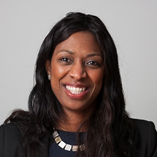
Karen Finlayson
Partner, PwC and Associate Lay Trust Board Member, Leeds Teaching Hospitals NHS Trust; Governor Sheffield Hallam University; former Chair of Audit Committee, Doncaster College
You can listen to Karen’s story in full on podcast here or search ‘Women on Boards Success Stories’ in all major apps:
Stepping out of your comfort zone on to a board
The initial decision to put herself forward for a board role was relatively straight-forward for Karen. She says, “I’m from Doncaster, I live in Doncaster and I’d attended Doncaster college. So when the Chair sent an email in to PwC to ask if anyone would be interested in joining the board, I was keen to put my hand up.”
She did however have some initial second thoughts when asked in the interview if she’d be prepared to join as Chair of the Audit committee. It’s quite understandable that this provoked what Karen describes as a ‘crisis of confidence’, given she had no prior experience as a non-executive. However, with the encouragement of her colleagues and support of her employer, Karen decided to stretch herself with a committee Chair role as her first NED position.
Whilst she reflects that it was a ‘brilliant experience’, her time on Doncaster College’s board wasn’t without its problems. “I was about 8 months into the role when it was identified that the college has some challenges with finance, governance and weren’t well regarded by Ofsted,” Karen reveals. This led to an intense period of restructuring and discussions with both the financial regulator and Ofsted.
“I felt out of my comfort zone having these conversations with regulators at an organisation I was relatively new to,” Karen admits, but ultimately sees it as a positive experience. “What I learnt was that I knew more than I thought gave myself credit for and that I could step out of my comfort zone and roll my sleeves up.”
In fact, this perspective impacted on to her executive career positively. “It gave me the confidence to push myself on for more challenging roles within PwC,” Karen explains, “I quickly progressing through to the Directorship as a consequence – and I genuinely feel it made a massive contribution to my future career.”
After leaving her role with the college, Karen became interested in contributing to a health board. She’d applied for one role at a hospital but been narrowly unsuccessful.
“I used my networks in the end, I just spoke to people about wanting to develop my understanding of health and how it operates.”
Karen was then approached for a role an Associate Lay Trust board member, which she explains means “I chair the panel that recruits consultants.” She clarifies this is more limited than a full board member, as it is focused on recruitment only, but reflects, “You do learn a lot about the organisations, and what they need and how candidates will fit.”
On reflection, Karen considers having this more limited role was better as it comes with a more limited time commitment, which is easier to balance with a full time job. Something which had become all the more demanding as Karen has recently been promoted to Partner at PwC when she joined the hospital’s board.
Networks
When an opportunity arose through her networks to apply to Sheffield Hallam University as Governor, Karen was keen to put herself forward. “I was very clear about what time commitment I could offer, especially with the NHS Lay Chair role” she admits. “It’s very different though as it’s a full board role so I’m involved with the strategy, operations and future planning.”
Noting that this goes far beyond her professional experience as an accountant, Karen counsels, “It’s easy to think ‘that’s not in my day job, so I can’t do it’. In fact, one of the committees were keen to have someone without direct experience to bring an outside perspective.” She explains, “You need an understanding, but having a different view is important to help with more diverse decision making.”
In terms of advice for those seeking board roles, Karen believes not having an accountancy background like hers needn’t be a barrier but it is important to articulate your skills in a relevant way. “Look at all your skills from a strategic, challenge or scrutiny point of view, rather than a deep specialist point of view,” she suggests, “Managing stakeholders, providing insight, creating strategy are all important non-executive skills that don’t have to have a competency basis.”
Proudest moment
Ultimately, Karen reflects that her proudest moment goes back to stepping out of her comfort zone to join the board of Doncaster college. “I’d never aspired to take on a Chair of Audit Committee role so early in my non-executive journey,” she reflects, “Despite all the challenges, we basically turned the college around. We improved the financial performance significantly, built fantastic relationships with the regulators and improved the quality of education for people in my local community.”
“It was absolutely worth the years I spent there. I genuinely feel I made a massive difference not for my own learning but to my local community. I’m very proud of that.”
